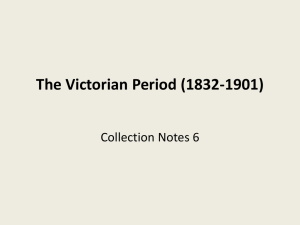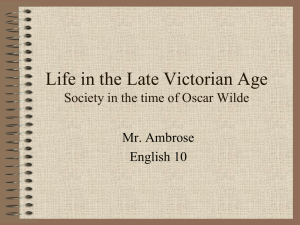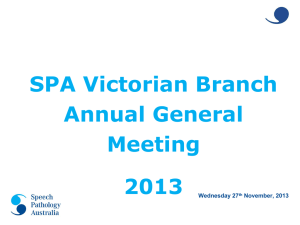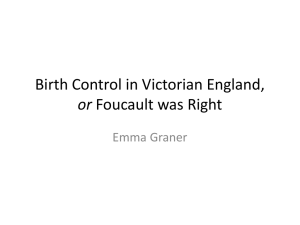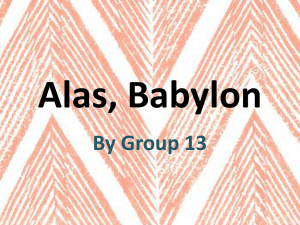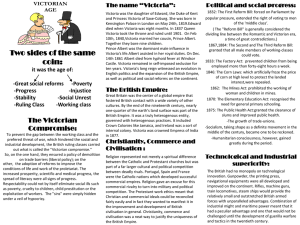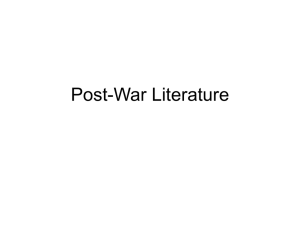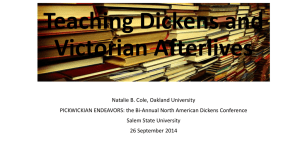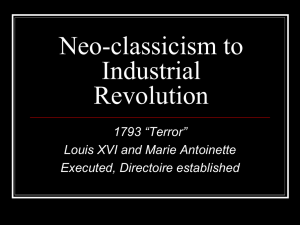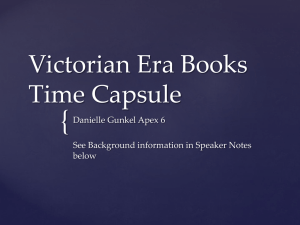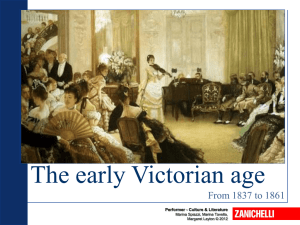VICTORIAN AGE - Istituto Sant`Anna
advertisement
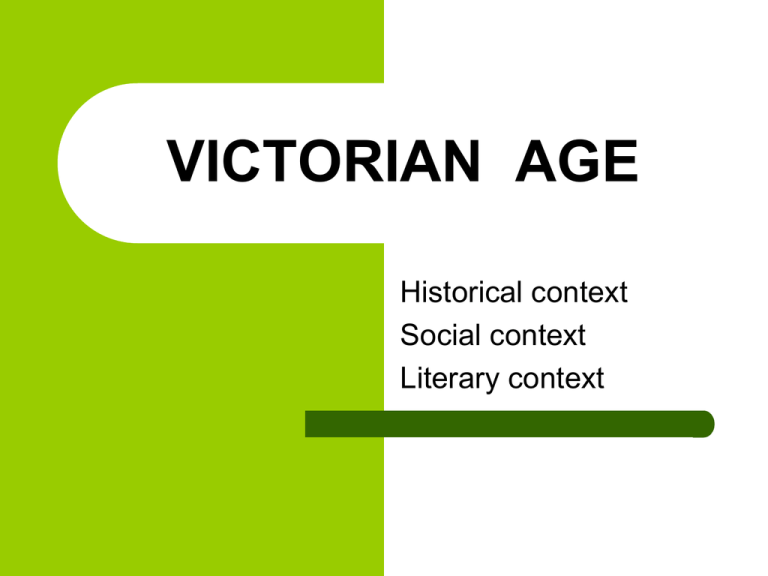
VICTORIAN AGE Historical context Social context Literary context Historical Context Queen Victoria’s reign (1837-1901) Longest reign in English history Period of unprecedented material progress imperial expansion political and constitutional development HOME POLICY: Political and Social Reforms FOREIGN POLICY: colonialism + imperialism Queen Victoria worked for the peace and prosperity of her country was able to keep at bay any conflict over constitutional matters reigned constitutionally avoiding the storm of revolutions played a more active role became a mediator above political parties model for her people: exemplary family life, strictly respectable and decent code of behaviour (Victorianism) beloved especially by the middle class who shared her moral and religious views Historical Context - Home policy POLITICAL and SOCIAL REFORMS 1832 – First Reform Act 1833 – Factory Act 1834 – Poor Law Amendment Act 1838 – the People’s Charter (Chartism) 1842 – Mines’ Act 1847 – Ten Hours’ Act 1867 – Secon Reform Act 1872 – Ballot Act 1870 – Elementary Education Act 1875 – Public Health Act 1884 – Third Reform Act 1880-1900 – Fabian Society Women’s Social and Political Union (Suffragettes) Historical Context – Home Policy Britain was a model of industrial success, individual freedom and constitutional government Upper and industrial middle-classes believed in a policy of “laissez-faire” ie. non-interference with industry or with national economy in order to promote free trade and free competition (=Liberalism) triumph of industry (steam engine, steamboats, shipbuilding, trains, iron industry) scientific progress (electricity, telegraph, gas-lighting, stamp+postal system, medicine) Historical Context – Foreign Policy THE BRITISH EMPIRE Imperialism = territorial expansion, colonies abroad During the Victorian Age the British Empire reached its largest extension: it was called “the Empire where the sun never sets” British Imperial power was sustained by: • willingness to protect British trade routes and interests against other nations; to gain new terrotories • firm belief in the excellence of English culture and institutions Historical Context – Foreign Policy 1839-1842 Opium War against China 1853-1856 Crimean War 1857 Indian Mutiny 1877 Queen Victoria was named “Empress of India” 1882 occupation of Egypt 1884 invasion of Sudan 1899-1902 Boers’ War Historical Context – Foreign Policy During the Victorian age most British citizens believed in their right to an empire and thought that imperial expansion would absorb excess goods, capital and population they were also extremely proud of their empire and of spreading their civilisation and culture to every corner of the globe (Jingoism=aggressive patriotism) colonial expansion was seen as a mission this was “the white man’s burden” Historical Context – Foreign Policy But at the moment of its greatest power Britain also discovered that every conquered area or land had new dangers to be controlled or stopped Britain found itself involved in a contradiction between its imperial ambition and its liberal ideas This contradiction would lead to the collapse of the British Empire in the 20th century. Socio-cultural Context Urbanization Britain became a nation of town dwellers Extraordinary industrial development Overcrowding Poverty – appalling living conditions in slums (squalor, disease, bad sanitation, crime, high death rate) Terrible working conditions (polluted atmosphere, disatrous effects on health especially on children) Socio-cultural Context VICTORIAN COMPROMISE A set code of moral values that explained the general tendency to be excessively puritanical and to avoid taking definite positions Socio-cultural Context Material progress + wealth emerge from hard work Appearance is very important Respectability = a mixture of both morality and hypocrisy, severity and conformity to social standards Philanthropy = charitable activity addressed to every kind of poverty Victorian family = a patriarchal unit where the husband was dominant and the wife was the angel in the home (tha fallen woman) Patriotism Private life was separated from public behaviour Socio-cultural Context It was a particular situation which saw two opposing aspects of life: on one side PROSPERITY and MATERIAL SCIENTIFIC PROGRESS, ETHICAL CONFORMISM, MORALISM and PHILANTHROPY which opposed on the other side POVERTY, UGLINESS, CORRUPTION, MONEY and CAPITALISTIC GREEDINESS Socio-cultural Context VICTORIAN FRAME OF MIND contained a lot of contradictions caused among other things by the influence of new philosophical trends, religious movements, economic theories and scientific discoveries of the period: Evangelicalism = good moral Christian conduct Utilitarianism = only what is useful is good, any problem could be overcome through reason Evolutionism = theory of evolution of species governed by natural selection and struggle for survival Determinism = theory which denies human freedom of action, everything is strictly governed by cause and effect Literary Background – VICTORIAN NOVEL During the Victorian Age for the first time there was a communion of interests and opinions between writers and readers enormous growth of the middle classes who were avid consumers of literature, they borrowed books from circulating libraries and read various periodicals. A great deal of Victorian Literature was first published in instalments in the pages of periodicals, which allowed the writer to feel he was in constant contact with his readers. Literary Background – VICTORIAN NOVEL The NOVEL became the most popular form of literature and also the main form of entertainment since thery were read aloud within the family. NOVELISTS felt they had a moral and social responsibility to fulfil: they depicted society as they saw it (realism) and denounced its evils (criticism) they aimed at making readers realise social injustices Literary Background – VICTORIAN NOVEL WOMEN WRITERS: a great number of novels were written by women. This is surprising if we consider the state of subjection of Victorian women but at the same time they were the majority of novel-buyers and of readers. However, it was not easy to publish so some women writers decided to use male pseudonyms in order to see their novels in print. VICTORIAN NOVEL – main features The narrator is obtrusive and omniscient: he provides his comments on the plot and he establishes a rigid barrier between what is right or wrong (judge); retribution and punishment usually appear in the final chapter where all the events, adventures, incidents are explained and justified. Didactic aim Linearity (stories have a beginning, a middle, an end) Long complicated plots and sub-plots VICTORIAN NOVEL – main features Urban setting: the city was the most common setting the main symbol of industrial civilisation as well the expression of anonymous lives and lost identities Precise creation of characters and deep analysis of characters’ inner lives (psychology) Most popular genre = Bildulgsroman (novel of formation) Main themes: money, wealth, realistic portrait of society denouncing its injustices and iniquities VICTORIAN NOVEL From a structural point of view we can divide Victorian Novels mainly into three groups: 1) EARLY-VICTORIAN NOVEL (or social-problem novel) dealing with social and humanitarian themes realism, criticism of social evils but faith in progress, general optimism The main representative was CHARLES DICKENS VICTORIAN NOVEL 2) MID-VICTORIAN NOVEL (novel of purpose) showing Romantic and Gothic elements and a psychological interest. The main representative writers were the BRONTË sisters and R.L.STEVENSON 3) LATE- VICTORIAN NOVEL (naturalistic novel near to European Naturalism) showing a scientific look at human life, objectivity of observation, dissatisfaction with Victorian values. The main representative writers were T.HARDY and O.WILDE. VICTORIAN NOVEL Other minor forms of novel developed in this period: 4) Novel of Manners focusing on economic problems of a particular class (W.Thackeray) 5) Colonialist Fiction presenting an exaltation of British imperialistic power (R.Kipling) 6) Nonsense literature dealing with fantastic adventures (L.Carroll)

